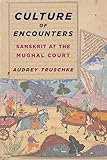Culture of Encounters : Sanskrit at the Mughal Court / Audrey Truschke.
Material type: TextSeries: South Asia Across the DisciplinesPublisher: New York, NY : Columbia University Press, [2016]Copyright date: ©2016Description: 1 online resource (384 p.) : 10 b&w illustrationsContent type:
TextSeries: South Asia Across the DisciplinesPublisher: New York, NY : Columbia University Press, [2016]Copyright date: ©2016Description: 1 online resource (384 p.) : 10 b&w illustrationsContent type: - 9780231173629
- 9780231540971
- 306.09 22/ger
- PK423
- online - DeGruyter
- Issued also in print.
| Item type | Current library | Call number | URL | Status | Notes | Barcode | |
|---|---|---|---|---|---|---|---|
 eBook
eBook
|
Biblioteca "Angelicum" Pont. Univ. S.Tommaso d'Aquino Nuvola online | online - DeGruyter (Browse shelf(Opens below)) | Online access | Not for loan (Accesso limitato) | Accesso per gli utenti autorizzati / Access for authorized users | (dgr)9780231540971 |
Browsing Biblioteca "Angelicum" Pont. Univ. S.Tommaso d'Aquino shelves, Shelving location: Nuvola online Close shelf browser (Hides shelf browser)

|

|

|

|

|

|

|
||
| online - DeGruyter Sacred Knowledge : Psychedelics and Religious Experiences / | online - DeGruyter Kosher USA : How Coke Became Kosher and Other Tales of Modern Food / | online - DeGruyter Industry and Intelligence : Contemporary Art Since 1820 / | online - DeGruyter Culture of Encounters : Sanskrit at the Mughal Court / | online - DeGruyter The Great East Asian War and the Birth of the Korean Nation / | online - DeGruyter Slow Boat to China and Other Stories / | online - DeGruyter Beyond the Secular West / |
Frontmatter -- Contents -- Preface and Acknowledgments -- Note on Transliteration and Other Scholarly Conventions -- Introduction: The Mughal Culture of Power -- [1] Brahman and Jain Sanskrit Intellectuals at The Mughal Court -- [2] Sanskrit Textual Production for The Mughals -- [3] Many Persian Mahābhāratas For Akbar -- [4] Abū Al-Faz̤l Redefines Islamicate Knowledge And Akbar's Sovereignty -- [5] Writing About The Mughal World in Sanskrit -- [6] Incorporating Sanskrit Into The Persianate World -- Conclusion: Power, Literature, and Early Modernity -- Appendix 1: Bilingual Example Sentences in Kṛṣṇadāsa's Pārasīprakāśa (Light on Persian) -- Appendix 2: Four Sanskrit Verses Transliterated in the Razmnāmah (Book of War) -- Notes -- Bibliography -- Index
restricted access online access with authorization star
http://purl.org/coar/access_right/c_16ec
Culture of Encounters documents the fascinating exchange between the Persian-speaking Islamic elite of the Mughal Empire and traditional Sanskrit scholars, which engendered a dynamic idea of Mughal rule essential to the empire's survival. This history begins with the invitation of Brahman and Jain intellectuals to King Akbar's court in the 1560s, then details the numerous Mughal-backed texts they and their Mughal interlocutors produced under emperors Akbar, Jahangir (1605-1627), and Shah Jahan (1628-1658). Many works, including Sanskrit epics and historical texts, were translated into Persian, elevating the political position of Brahmans and Jains and cultivating a voracious appetite for Indian writings throughout the Mughal world. The first book to read these Sanskrit and Persian works in tandem, Culture of Encounters recasts the Mughal Empire as a polyglot polity that collaborated with its Indian subjects to envision its sovereignty. The work also reframes the development of Brahman and Jain communities under Mughal rule, which coalesced around carefully selected, politically salient memories of imperial interaction. Along with its groundbreaking findings, Culture of Encounters certifies the critical role of the sociology of empire in building the Mughal polity, which came to irrevocably shape the literary and ruling cultures of early modern India.
Issued also in print.
Mode of access: Internet via World Wide Web.
In English.
Description based on online resource; title from PDF title page (publisher's Web site, viewed 02. Mrz 2022)


